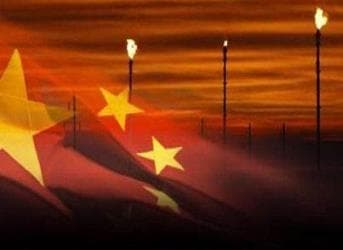China’s relentless search for global energy assets to fuel its voracious economy is one of the decades biggest stories, with Beijing willing to sign deals anywhere, anytime.
That search for foreign supplies has begun to eat into an area Moscow previously regarded as its sole domain, Central Asia, while China’s search for indigenous energy supplies bring it into potential conflict with its Asian neighbors.
The one constant in this picture is the 24/7 consistency of China’s efforts, and how its neighbors react.
The Russian Federation is clearly rattled by Beijing’s encroachment into Central Asian energy reserves.
How unsettled?
The Russian Federation’s pipeline monopoly Transneft has generously decided to charge its giant eastern neighbor Kazakhstan “domestic rates” for Kazakh oil transit through its pipeline networks to the Russian Federation’s Novorossiisk oil transit port on the Black Sea.
How big a concession is this? As the U.S. government’s Energy Information Agency notes, “Kazakhstan, an oil producer since 1911, has the second largest oil reserves as well as the second largest oil production among the former Soviet republics after Russia… Kazakhstan's current production is dominated by two giant fields: Tengiz and Karachaganak, which produce about half of Kazakhstan's total output.”
The fly in Astana’s ointment? The EIA reports, “Most of the current pipeline system was developed as part of the Soviet system, and its goal was to maximize transport of oil for Russia. Following the break-up of the Soviet Union, Kazakhstan was wholly dependent on Russia for its exports, giving Russia complete control over Kazakhstan's exports. Over time, however, Kazakhstan has been able to reduce its dependence on Russia's infrastructure by utilizing trans-Caspian tankers and rail, and by building a pipeline to China. Still, a majority of its exports have to be shipped via Russia's pipelines.”
The Russian Federation maintained control over Kazakhstan’s initial oil exports by routing them through the Caspian Consortium’s pipeline to transport Caspian oil from Kazakhstan’s Tengiz field to Novorossiisk, along with being a transit line for Kazakh oil from its Kashagan and Karachaganak fields. A notable feature of the CPC pipeline is that it remains the only oil export pipeline in Russian territory not wholly owned by Transneft, which has a mere 24 percent of the pipeline.
So, why the price concession?
Simple – Moscow wants to retain as much Kazakh oil flowing westwards via CPC rather than see it flow eastwards to China.
But if Kazakhstan is the major area of Russian concessionary interest, it also is concerned about China’s penetration of the former Soviet Central Asian republics.
And China has quietly been sawing off Moscow’s legs for a decade, with its spear carrier being Chinese state-owned oil and gas corporation China National Petroleum Corp., the largest integrated energy company in the People's Republic of China.
In 2003 Premier Hu Jintao visited Kazakhstan to develop the "Pan Asian Global Energy Bridge", with explicit plans for CNPC transit routes through central and western China, Central Asia and Iran through to the Persian Gulf. After Turkmenistan was confirmed as having the world's fourth largest reserves, CNPC intensified its efforts there and the rest of Central Asia, building the Central Asia-China natural gas pipeline, which came online in 2009, with a projected capacity of 60 billion cubic meters a year by 2015.
Not that Beijing wants to import energy forever. State-owned Chinese oil and gas firm China National Offshore Oil Corp. intends shortly to submit for state approval a plan to develop Huangyan phase II and Pingbei, totaling seven new fields, in the East China Sea.
ADVERTISEMENT
The only minor issue in the picture is that some of the waters are claimed by Japan.
Accordingly, from west to east, China’s aggressive energy pursuits seem certain to ruffle its relations with its neighbors Russia and Japan, both of whom it fought in the last century.
Better then spread some hefty piles of yuan around Moscow and Tokyo.
By. John C.K. Daly of Oilprice.com



















But it's not 2005, and China cannot afford to behave as if it were. The Chinese economy is now so far out on so many limbs that no one can predict where all the pieces will end up.
http://www.bloomberg.com/news/2013-07-30/black-holes-at-china-s-shadow-banks.html#disqus_thread